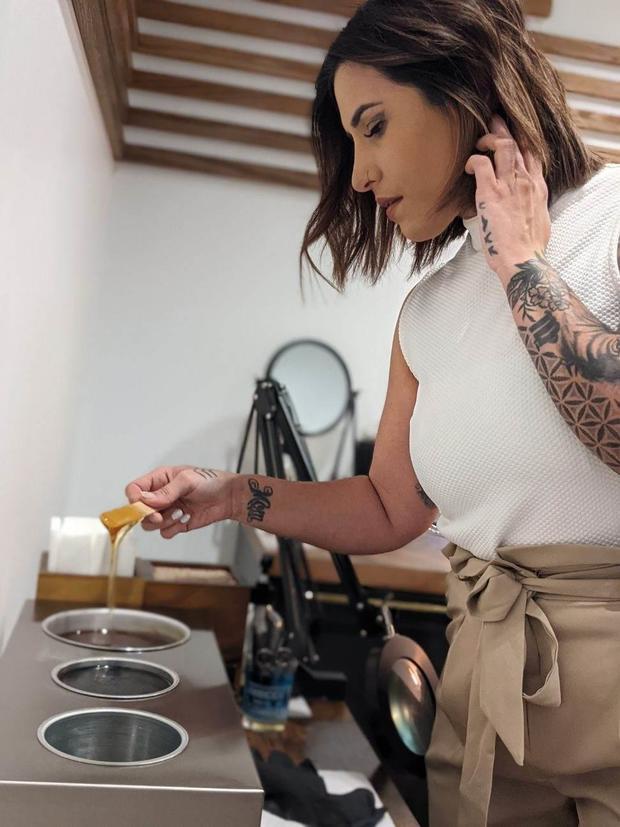Locked out of a PPP loan, one woman sold her wedding ring to keep her business afloat
Even before the pandemic, Ashlie Ordonez had made sacrifices to open her beauty salon. She and her husband sold their house to raise the capital to pay for the lease and other costs related to starting the business, which opened its doors in Denver in March 2020.
Opening her salon turned out to be just the beginning of Ordonez's struggles. The pandemic forced her to close the business temporarily. And when she applied for a loan through the Paycheck Protection Program — a relief effort to help small businesses like hers — she was turned down.
"They said my business didn't suffer an economic disaster," Ordonez recalled. "Which doesn't make sense, because I was forced to close immediately."
The hitch, she learned, was that her salon hadn't been in operation before February 15, 2020, the cutoff date for businesses to qualify for a PPP loan. Ordonez was also turned down for loans from banks, who told her they didn't lend to "microbusinesses" like hers, or that she was too much of a risk because the business was new. Locked out of relief aid and bank loans, she turned to one asset she literally had on hand: Her $13,000 wedding ring.
"It was hard to hand over, and it was extremely hard for [my husband]," said Ordonez, who sold the ring back to the jewelry store for $11,800. "But I didn't want to lose the business. The thought behind the business was so much bigger than the ring itself."
It's not as if PPP funds aren't available. With $50 billion left in funding, President Joe Biden signed the PPP Extension Act on Tuesday, extending the program until May 31. More than 8.2 million PPP loans have been provided through the program, but White business owners have been more successful in securing aid.
Eight in 10 businesses owned by White owners older than 45 received the full loan amount they requested, compared to only 6 in 10 Latinx-owned firms and fewer than 5 in 10 Black-owned firms, a new study from the Federal Reserve of New York and AARP found.
Ordonez, who is Latina, Native American and White, is among a surge of new entrepreneurs who opened their businesses at the start of, or during, the pandemic. Some were driven by a desire to own their own business as well as the need to seek out new opportunities after having lost their job or income due to the crisis. These entrepreneurs also share other commonalities: Many of them are women and/or people of color, who have struggled to qualify for relief aid.
Forty-seven percent of new businesses started in the past year are owned by people of color, according to a recent survey from Gusto, which helps businesses with payroll and other services. Women have also turned to entrepreneurship, also partly out of necessity. About 4 out of 10 women who started businesses in the past year said they did so as a direct response to the pandemic, such as after losing a job or another disruption, the survey found.
Women and people of color are among those facing the toughest hits from the pandemic, partly because they are over-represented in industries that closed amid the pandemic, including beauty salons like Ordonez's. About 9 out of 10 workers in the salon industry are women, according to Data USA.
"Common-sense practices"
Many of those new businesses have been cut out of federal relief programs — an issue that calls for a remedy, said Lexi Reese, chief operating officer of Gusto.
"No one should have to sell their wedding ring to stay afloat, especially when PPP funds are still available," Reese said. But, she aded, "some real common-sense practices could make sure those stories like Ashlie's don't happen."
One of Reese's recommendations is to change the February 15, 2020 cutoff date that excludes businesses started after that point from applying for aid. Many entrepreneurs started new businesses during the pandemic as a result of losing their jobs, and barring them from aid would be harmful to the broader economy, she noted.
The economy this year is expected to experience its fastest growth since the 1980s, driven by vaccine distribution and ongoing support from the federal government, according to Oxford Economics. Annualized growth should reach close to 10% this spring and summer, Oxford forecast.
The risk is that many of those new businesses could fail before they succeed, given the lack of financial support from the government and the banking industry. A recent study found lenders treated women and people of color "less favorably" than White-male applicants when they applied for loans during the pandemic, even when the non-White and/or female applicants had stronger financial profiles.
Providing more relief aid to businesses opened in the last year would help seed economic growth later this year and beyond, in Reese's view.
"We have the opportunity to take this, 'Hey, we're scraping for survival moment,' and turn it into one of the biggest job gains and economic powerhouses that we've ever seen," Reese said.
From being laid off to employing 25 therapists
One business started after a layoff was North Star Behavioral Consultants, which provides therapy services primarily to people with autism in Washington state.
Cofounders Anna Rogers and Catherine Wright started the business out of necessity last year, after the company they worked for "got spooked and laid us all off," Wright told CBS MoneyWatch.
But their clients needed more services, not fewer, especially with the issues that came with the pandemic, such as school closures and reduced services. So they decided to strike out on their own — and now have about 25 therapists working for the business.
The problem, they said, is that they haven't been able to get a PPP loan because they started North Star after the pandemic began. They found that reasoning unfair, given that the pandemic was the direct cause of the job loss that precipitated the start of the business.
"It was more than just us, it was all our coworkers — all of them lost their jobs because of COVID," Wright added. "It was a frustration that it was wasn't covered."
They secured a bank loan only after Rogers put up her house as collateral. For now, they are keeping expenses low — they don't pay themselves for running North Star's business operations — and are working on repaying the loan, which they believe could take 10 years. If they had access to PPP aid, they believe their business could grow faster.
"We would be able to offer more benefits, which would make us more competitive for hiring and do some of the things that could help recruitment and retention," Rogers said. But, she added, they're thankful the business is growing and supporting dozens of families, "Every month we're like, 'We're still doing it.'"




